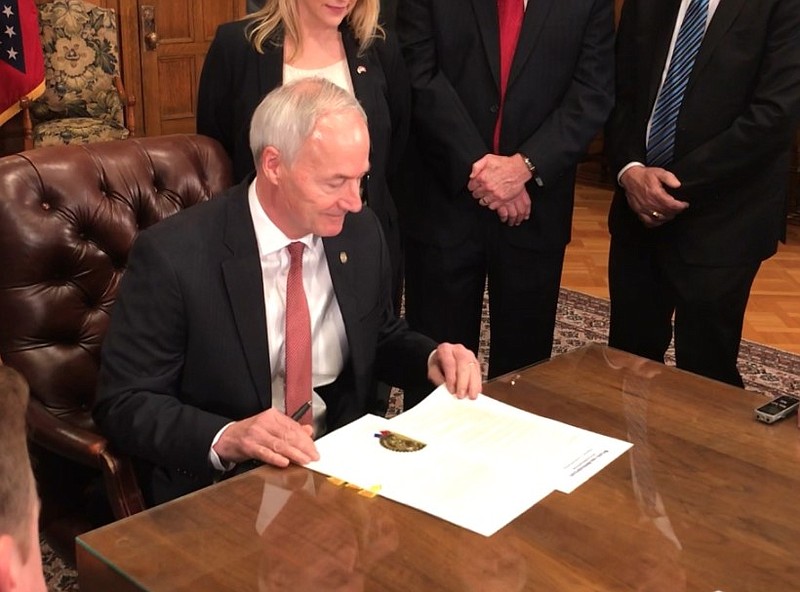Gov. Asa Hutchinson has signed an executive order aimed at preventing employers in Arkansas from having to pay nearly $210 million in increased unemployment insurance rates this year as a result of joblessness stemming from the covid-19 pandemic.
The Republican governor signed this executive order Dec. 29. The order says it "shall expire February 27, 2021, unless renewed in whole or in part by a subsequent executive order."
Hutchinson referring to the order in an interview Wednesday with the Arkansas Democrat-Gazette, which asked about the possibility of employers having to pay higher insurance rates this year.
"My thinking is that when we are seeing small businesses trying to recover and to survive during this time, we don't need to hit them with a tax increase ... right now," he said.
"This keeps us at a lower rate and I do believe that we'll be able to come out of this down the road," Hutchinson said. "We are going to have to address it next year either by putting additional money in there or by passing this legislation, so I am hopeful that this will prevent long term that increase that would have happened otherwise."
Department of Commerce Secretary Mike Preston said the executive order issued a non-charge for all unemployment insurance payments during the months of April, May and June last year for about 26,000 employers that had nearly $210 million in claims.
[CORONAVIRUS: Click here for our complete coverage » arkansasonline.com/coronavirus]
Some of the employers would have faced unemployment insurance rates this year that were double, triple or four times last year's rates in the absence of the governor's executive order, he said.
The increased rates "probably would be the straw that broke their back" for some small businesses, Preston said.
The executive order effectively keeps these employers' unemployment insurance rates at the same level as last year, he said.
In September, the state transferred $165 million in federal coronavirus relief funds to the unemployment insurance trust fund to avoid an estimated $10 million increase in unemployment insurance rates on employers, Preston said.
In November, the Hutchinson administration originally planned to transfer another $50 million in federal coronavirus relief funds to the trust fund, in addition to the previous transfer of $165 million, to mitigate nearly $210 million in increased unemployment insurance rates on employers. But the administration temporarily put that plan on hold and authorized spending the $50 million on hospital and nursing home-related costs related to covid-19.
In mid-December, the Legislative Council approved the administration's request to transfer what one state official estimated to be roughly $100 million in federal coronavirus relief funds to the unemployment insurance trust fund, in the event that Congress didn't extend the Dec. 30 spending deadline for states to spend the relief funds. But Congress extended that deadline until the end of this year as part of the coronavirus relief and government funding bill that President Donald Trump signed into law Dec. 27.
Preston said Wednesday that state officials will work with the Legislature to enact legislation in the regular session, which starts Monday, to continue the non-charge to employers from the claims against them in the second quarter of last year, after the executive order expires.
If the unemployment insurance trust fund balance falls below $600 million next June 30, employers could face an increase in the taxable wage base, the portion of wages subject to unemployment insurance taxes, and that would mean an increase in their unemployment insurance taxes, he said.
The Legislature could reduce the required trust fund balance to avoid that increase or add more funds to the trust fund to bring the balance back up to $600 million, Preston said.
The state's unemployment insurance trust fund totaled $798 million as of Tuesday, Department of Commerce spokeswoman Alisha Curtis said Wednesday.
Preston said it's not clear if the state's unemployment insurance trust fund will drop below $600 million by June 30 based on unemployment insurance claims during the next several months.
"I think we'll be OK, but we want to be safe and keep that covered," he said.
Under the federal Coronavirus Aid, Relief, and Economic Security Act enacted by Congress and Trump in March, the state received $1.25 billion in federal coronavirus relief funds.
Hutchinson appointed a 15-member Arkansas CARES Act steering committee to recommend the best uses of that money to him. The steering committee includes nine Hutchison administration officials and six state lawmakers.
Hutchinson said Wednesday that Arkansas will continue to have the CARES Act steering committee because of the extended deadline. The state still has unallocated and unspent relief funds.
The unallocated balance of those relief funds continues to be $41.9 million, while the unspent amount allocated to state agencies has decreased to $87.69 million, said Scott Hardin, a spokesman for the state Department of Finance and Administration.
